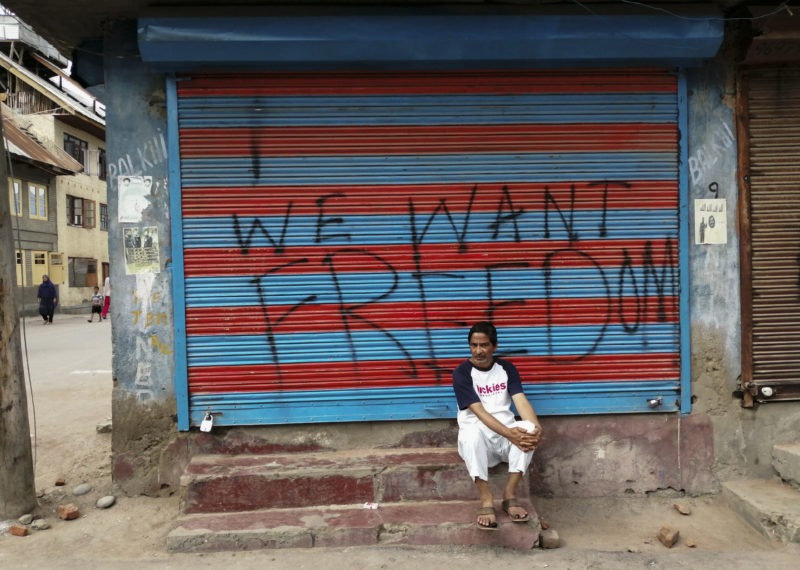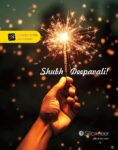‘We won’t give an inch’: India faces defiance in ‘Kashmir’s Gaza’
Soura neighbourhood has sealed itself off from Indian security forces (Jalees ANDRABI)
Srinagar (India) (AFP) – Young men sit beside a pile of rocks and a bonfire, protecting the only entrance to a besieged neighbourhood they call “Kashmir’s Gaza” as a mosque loudspeaker broadcasts slogans of liberation.
In an act of defiance against New Delhi’s controversial decision to strip the Muslim-majority region of its autonomy, Soura neighbourhood on the outskirts of Kashmir’s main city of Srinagar has sealed itself off from security forces.
Since early August, residents have erected ramshackle barricades of tin sheets, wooden logs, oil tanks and concrete pillars, and dug trenches to keep soldiers at bay amid daily protests against India.
“They can only enter Soura over our bodies. We won’t give even an inch of land to India,” Mufeed, a resident who volunteers to guard the neighbourhood at night, told AFP.
“Just like Gaza is resisting Israel, we will fight for our motherland with all our might,” Mufeed added.
Kashmir has waged a three-decade long armed rebellion against Indian rule with tens of thousands of lives, mostly civilians, lost in the conflict.
Ahead of the announcement, India rushed tens of thousands of extra troops to the restive region to join 500,000 already in the valley, and imposed a strict clampdown fearing further unrest.
But protests have broken out, with the lower-middle class Soura leading the way. At least 15,000 people rallied on August 9 — the biggest demonstration in Kashmir so far.
They were met by security forces firing live ammunition, tear gas and pellet guns to disperse the crowds, with more than two dozen people reportedly injured.
– ‘Go India, go back’ –
Soura, a crammed lakeside community of more than 2,000 homes, is surrounded by security forces on three sides.
The renowned mosque Jenab Saeb has become an assembly point for thousands of protesters in the neighbourhood.
Every night, residents march through its narrow lanes, carrying torches and passing graffiti with the words “Freedom for Kashmir” and “Go India, go back”.
Locals pass along messages if they spot any police movement on the main highway just beyond Soura.
Police forces, who have deployed drones and helicopters, tried to enter Soura at least three times but were pushed back by stone-throwing youth, some also armed with axes and harpoons.
Familiar with police’s crowd-dispersing tactics, protesters use saltwater to wash their faces after chilli and tear gas are fired, and wear helmets and glasses to protect themselves against pellets.
Three youths have so far been arrested after venturing out from the area.
“They (India) are testing our resilience and they will definitely fail,” local Nahida told AFP.
“We defeated them last time and even if this situation continues for years, we won’t give-in.”
Despite the Soura protests, authorities stress that Kashmir has remained largely peaceful since the lockdown.
– ‘Making amends’ –
Soura has long been part of restive Kashmir’s history since the region was divided between India and Pakistan after independence from the British in 1947.
It was the birthplace of Kashmir’s former prime minister Sheikh Abdullah, who agreed to join India as a state with autonomy rights.
His National Conference party — which has fought for more autonomy while being under Indian rule — ran the state for more than three decades, with his son Farooq Abdullah and grandson Omar Abdullah becoming chief ministers.
Farooq and Omar Abdullah were detained by New Delhi as part of the lockdown.
Residents have become more anti-India in recent years. In 2016 when mass street protests broke out over the death of a popular militant commander, Soura was the scene of dozens of clashes with government forces.
Soura resident Rafiq Mansoor Shah said many locals shared his misgivings about Abdullah’s decision to accede to India.
Under the new arrangements announced this month, Indians from other parts of the vast nation can now apply for government jobs and buy property in Kashmir. But many Soura natives like Shah believe New Delhi has “nefarious plans to grab our land”.
“Because of (the Abdullah family’s) greed for power… we have become slaves of India. We are trying to correct the historical mistake,” he told AFP.
“We are trying to lead and inspire the rest of Kashmir.”
Disclaimer: Validity of the above story is for 7 Days from original date of publishing. Source: AFP.


